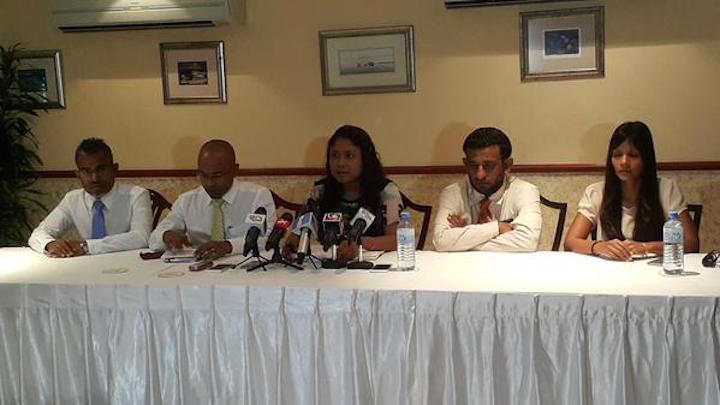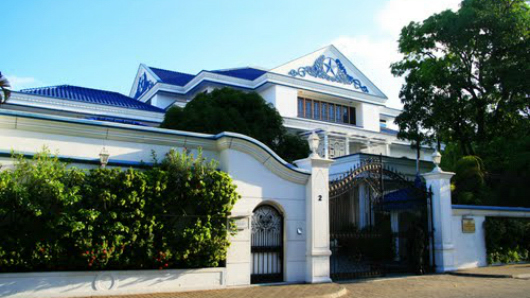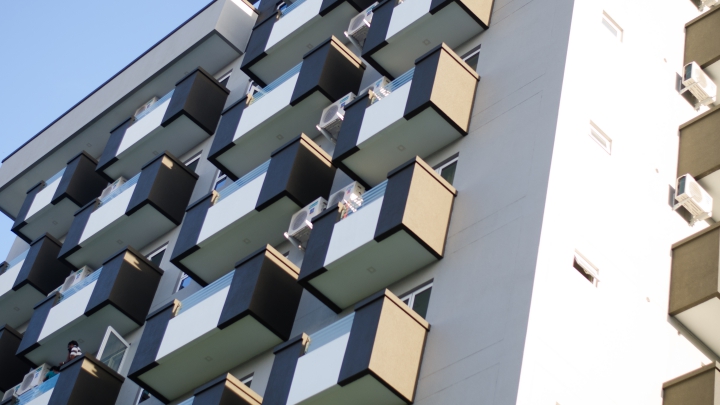Questioning the state’s decision to appeal a terrorism conviction against former President Mohamed Nasheed, lawyers revealed today that the opposition leader’s 13-year jail sentence was commuted to house arrest on July 19.
“The government of the Maldives has permanently moved President Nasheed to house arrest for the balance of his 13-year term in prison,” the opposition leader international lawyer Jared Genser told reporters in Colombo this afternoon.
The Maldivian high commission in Sri Lanka confirmed the move to AFP. Nasheed’s domestic legal team told Minivan News the decision had been communicated in writing.
The PG office announced the decision to appeal the guilty verdict yesterday amidst rumours that President Abdulla Yameen will pardon Nasheed in exchange for the main opposition Maldivian Democratic Party’s (MDP) backing for several crucial votes in parliament.
Speaking at a press conference in Malé today, lawyer Hassan Latheef said the legal team believes the government has exerted undue influence over the PG to appeal the case in a bid to appease growing international pressure.
The European parliament, the British prime minister, the US secretary of state, the UN Human Rights Council and various international organisations have called for Nasheed’s release, Latheef noted, adding that the legal team had expected the former president to be pardoned as a result of talks.
But President Yameen could now “tell the international community that President Nasheed’s case is out of his hands,” Latheef suggested.
“We believe that there is intense foreign pressure on the government to release President Nasheed and the case was on President Yameen’s table. But we now believe that the government has sent the case to the prosecutor general’s table,” he said.
The government will be able to tell the numerous foreign diplomats expected to arrive in the Maldives to attend an official function to celebrate 50 years of independence on July 26 that Nasheed’s case has been appealed by the state, Latheef said.
Some diplomats would accept that the president could not intervene in the judicial process or grant clemency before the appeal process is exhausted, he added.
Latheef said the legal team will decide whether or not to participate in the “charade” following consultations with Nasheed’s international lawyers. The state’s sudden reversal of stance may affect ongoing talks between the opposition and the government, lawyers suggested.
Genser meanwhile told reporters today that he was denied a business visa to work in the Maldives last week and was told that he needed further authorisation from the Supreme Court certifying that he was licensed to practise law internationally.
“There is no Maldivian law, regulation, or rule that imposes such a requirement on applicants for business visas who are lawyers – it appears the Supreme Court specially designed this requirement just for me,” he said.
Genser is representing Nasheed along with Amal Clooney, the wife of Hollywood actor George Clooney, and Ben Emmerson, a UN rapporteur on counter-terrorism and human rights. The international lawyers have filed an appeal at the UN working group on arbitrary detention seeking a judgment declaring Nasheed’s imprisonment illegal.
Appeal
In a brief statement yesterday, the PG office said the decision to appeal the conviction was made based on concerns raised over due process in the trial and Nasheed’s request for the PG to appeal the conviction as well as his contentions over procedural violations, insufficient time to mount a defence, and inability to appeal due to the criminal court’s failure to provide a full report and transcripts of the trial within a 10-day period for filing appeals.
Lawyer Hisaan Hussain noted that Muhsin had repeatedly rejected requests for the state to appeal the conviction, insisting that Nasheed could file an appeal despite the lapse of a 10-day period and that the PG would not appeal a verdict in his favour.
The PG’s sudden reversal of stance while talks seeking Nasheed’s release were ongoing “raises questions about his purpose and intent,” Hisaan said.
Muhsin told the press in May that he believed Nasheed’s appeal had “a high possibility of being accepted at the high court since Nasheed is a former president, since it is related to a judge and since it is a terrorism charge.”
The Supreme Court had shortened the appeal period from 90 days to 10 by striking down provisions in the Judicature Act a month before Nasheed’s arrest on February 22.
Last month, the High Court, citing lateness, rejected an appeal filed by the Prosecutor General over the acquittal of a defendant on murder charges.
On June 20, President Yameen rejected Nasheed’s appeal for clemency, urging him to exhaust all appeal processes first. The opposition leader’s lawyers say that the Clemency Act grants the president the discretion, on the president’s own initiative, to commute the sentence of any individual convicted of a criminal offence.
The next day, Nasheed was transferred to house arrest for eight weeks.
Shortly thereafter, the MDP and the government began talks on clemency for Nasheed and other jailed politicians as well as the withdrawal of charges against some 1,400 opposition supporters.
Opposition MPs subsequently backed the impeachment of vice president Dr Mohamed Jameel and a constitutional amendment setting new age limits for the presidency and vice presidency. The amendment allowed President Yameen to replace Jameel with the influential tourism minister Ahmed Adeeb.
The MDP also issued a free whip on a second constitutional amendment to allow foreign freeholds in the Maldives. Some 19 opposition MPs, including ten MDP MPs, voted to pass the amendment.
At the fourth meeting of talks last week, MDP representative Ibrahim Mohamed Solih had suggested that Nasheed may be released before July 26.
The UN working group on arbitrary detention is meanwhile expected to rule on Nasheed’s imprisonment in September or October. In a response to the UN, the government insisted Nasheed must appeal the sentence.






